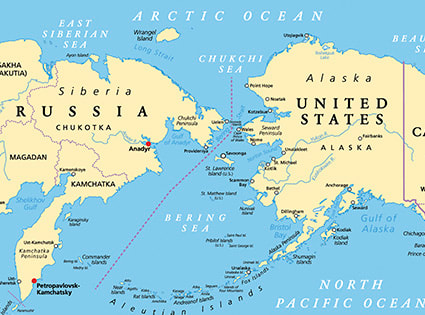“The Militarization of the Arctic is a Challenge, but not a Threat.”
Two defense magazines, the American Breaking Defense and the French Meta-Défense, claim that the militarization of the Arctic by Russia and China worries our country’s navy. But Professor Robert Evan Ellis of the U.S. War College’s Strategic Studies Institute tells Sol de Medianoche that it is “a challenge” but not “a threat” (yet).The increasing militarization of the Arctic by Russia and China is “a major security issue,” U.S. Fleet Forces Commander Adm. Daryl Caudle told Breaking Defense magazine on Sept. 5. Just 24 hours later, France’s Meta-Défense echoed these sentiments.
Episodes of Russian fighters and bombers, some of them nuclear-capable, in international waters off the coasts of Alaska and Canada are becoming more frequent. These flights have provoked the immediate reaction of the U.S. and Canadian air forces and the mobilization of NORAD (North American Aerospace Defense Command), the joint military force of the two North American countries. At the same time, in the first week of August, a joint Russian-Chinese naval force of eleven warships patrolled near Alaska, in one of the closest approaches to U.S. shores to date, according to U.S. Northern Command. Russian and Chinese ships have sailed very close to the Aleutian Islands without ever entering U.S. waters. The most recent incident occurred in late August. Days earlier, the United Kingdom intercepted two Russian bombers flying over NATO’s air surveillance zone north of Scotland, which were detected by the Netherlands and Denmark, while Russia threatened a Norwegian military patrol plane over the Barents Sea. Such tensions in the Arctic have been reported in Sol de Medianoche, as have Chinese “spy balloons,” one of which flew over much of Alaska and other U.S. states. It appears that Russia and China are testing the response capacity of U.S., Canadian, and generally NATO forces in the Arctic, a “surveillance flank” even before the historic entry of Sweden and Finland into the Alliance. In addition, its surveillance and defense come at the expense of other vulnerable areas. For Professor Robert Evan Ellis, a researcher at the U.S. Army War College’s Institute for Strategic Studies, “the Arctic is becoming of great interest, but not only from a tactical and military point of view. Russian aircraft flights and the presence of Russian and Chinese ships are arguably a challenge to the United States, but not a direct threat, at least for the time being.” According to Evan Ellis, “Global warming and the resulting melting of the North Pole are being studied by the major powers. The Indian government has also emphasized the vital importance of the Arctic to its country because of the problems associated with climate change. But above all, Russia and China are interested in exploring the area as an alternative commercial sea route, given the danger of other routes, such as the Black Sea, because of the war over the Russian invasion of Ukraine.” “In fact,” analyst and military strategist Robert Evan Ellis tells Sol de Medianoche, “the Arctic was not one of the major concerns of the allies until 2014, when regional cooperation suffered, though without being interrupted, after the first Russian aggression in Ukraine.” |
